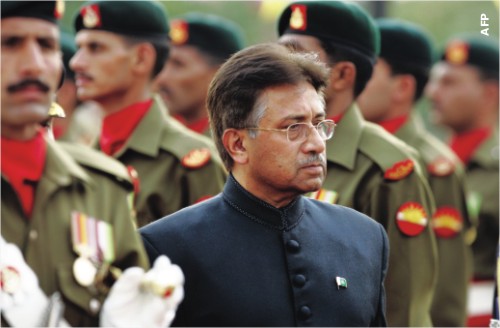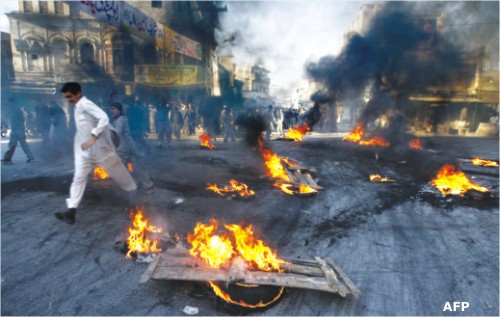
Inside
|
Looking West Farid Bakht explores what lessons might be learned from the Pakistan experience The ex-general, now president, is confident enough to leave the country for a European tour. He must feel he has averted his worst crisis and does not expect a coup or a civil uprising. The elections due for January have been conveniently postponed while the leading opposition party sings: "Bhutto is dead, long live the new Bhutto." If this is how democratic parties operate, then is it any wonder that this form of democracy is so distrusted? In time-honoured South Asian dynastic politics, the Pakistan People's Party laid the Queen to rest, and inaugurated a 19 year old student as the heir. The worst (almost comical) element was the appointment of Mr. 10% as the "regent." The global media was so feverish in its speculation about the end of Pakistan a few weeks ago. Now the cameras have moved on, should we conclude that the media got it wrong and that Pakistan has a long and glorious future this year?
Not so fast. Pakistan was never going to break up this decade and Bhutto was no more than an important figure, though certainly not decisive in the scenarios for the medium term. The questions about the country's future, in its present shape and size, are legitimate. All that has happened is that the short term plans have unraveled. The Anglo-American embassies, agencies, and think tanks thought they could engage in Asian matchmaking. The forced marriage between Musharraf and Benazir Bhutto was meant to shore up a supposedly secular government, whatever secular means in Pakistani politics. Few people seem to remember how Benazir as PM supported the Taliban in Afghanistan in a calculated piece of political expediency. So is Nawaz Sharif the favoured army candidate, along with assorted Islamic parties and cricketer-turned-politician Imran Khan? Anything can happen in Pakistani politics. We can merely observe what deal the Saudis or Anglo-Americans can secure with the army and corrupt politicians. Bangladesh or Pakistan? Not to say our situations are at all comparable; nevertheless it is worth noting, funnily enough, that the previous paragraph could also have been written about Bangladesh. As we well know there are historical reasons for such similarities. It is imperative that as Ekushey and then March 26 arrive, we face up to the unpalatable fact that there is a pronounced pro-Pakistan tilt among too many of the elite in Dhaka. They will camouflage their true alignment with bouts of nationalist rhetoric. After all, even Jamaat can claim, with a straight face, that they were Bangladeshi nationalists in 1971. They hope that time will erode the memories and that they can re-write history. Nevertheless, we should not focus only on Jamaat and old Muslim Leaguers. Their leaders from that era deserve to have their records examined and be prosecuted. That goes without saying, though it has taken more than three decades for intellectuals to realise that the constitution allows trials. That process is all about looking back and drawing a line once and for all. While we need to do that, we should not also wallow in grief and continually hark back to the golden age of liberation struggle, while covering up the strategic mistakes made by most of the national leadership of that era. I am more interested in what Pakistan means as we look forward. In particular, what does it mean to the elite who have never given up their sympathy for Pakistan? It reached its apogee during the period of the last regime. Given we are in a state of transition, it is opportune for us to take a new look at what motivates our elite and where it is going to take us. It is up to ordinary Pakistanis to decide their own fate. The tragedy is that they have never been able to. I do not argue for the dissolution of that state. I just cannot see it survive because no progressive political force looks like forming in the near future. Instead, I would prefer we thought more about the interests of Bangladesh and think anew about what we need to do for our own benefit. For instance, I am a firm believer in close relations with the Seven Sister states. Our future is wrapped up with theirs. However, what do we do? We lump these states (rich in resources and culture, but woefully neglected by Delhi ) as "India," so we refuse to open borders and trade with our historical partners. We think Asian highways are a threat to our sovereignty, so we build roads in Myanmar to get to China. I am not unaware about Indian commercial interests but our obduracy speaks volumes about our timidity and inability to stand up and be counted. We ignore the aspirations of our true neighbours (states, not India as a whole) and think it is enough to only offer them a puny bus route from Agartala or a few trains from Kolkata. We talk big about Chittagong port but do everything to make travel difficult to Meghalaya or the North-East. Have you tried to cross the border at Tamabil? Try it sometime. You will understand how the decades long Pakistani inherited policy of shutting off our land boundaries is frustrating and economically ruinous (to us). We cannot distinguish between the proud peoples of India's North-East and the policies of an indifferent centre in Delhi. It is about time we learned. Even today, if we call for better relations with West Bengal, that is classified as being anti-Bangladesh or pro-India. The small minded, parochial elite does not realise that Delhi (South Block) would prefer we did not improve relations with West Bengal. The last thing the elites in Islamabad and Delhi need is Eastern South Asia working for common regional development. They want the great diversion to continue for a few decades more. I would vouch that the elites in Delhi and Islamabad get on far better than with their equivalent in Dhaka. They use the rivalry for their own ends, and we foolishly play our lapdog role. Bangladesh does not have the luxury of engaging in diversions put ever so beautifully in place by an Imperial Britain in 1947. We must look at the atlas and re-calculate our bearings. However, before I get a knee-jerk reaction, let me reiterate that I do not succumb to the notion that we need to forsake Pakistan for India. It does not have to be one or the other. Geo-politics does not have to be binary. We have to come out of our inferiority complex and start getting smarter in our relations. This kind of thinking is alien to a lot of our civil society leadership. Their terms of reference is to get as close as they can get to Washington, and, by extension, the aid agencies, and maintain distance from India, primarily by cozying up to Islamabad, and, by extension, the rich Arab oil states. Nothing will change their deep-seated orientation. Unless, some of the foundations give way. The weak link is Pakistan. Pakistan depends on the army, period. As long as the military is united and financed, then it presents an insurmountable barrier to disintegration. As long as it remains united. Is Pakistan in an end-game? What would you say if the entire Bangladeshi South-West had slipped out of the centre's control? Think of the equivalent of Jessore and Khulna being run by Pashtun mullahs and their own militia, defying regular army units. That is what is happening today in the Pashtun North West Frontier Province. Ditto Waziristan. Now consider if the equivalent of North Bengal (Baluchistan) were in open rebellion with open warfare with the centre's troops. You would say the western half of the country is out of control. Finally, you would look towards the equivalent of our port city of Chittagong, Karachi. Fortunately, we do not have anything comparable to Karachi's civil disorder. Sounds like a failing state? Many here would be ringing up their long lost cousins in New York and arranging their visas, if things ever got even remotely so bad here in Bangladesh. The Punjabi centre has put down rebellions in the past, most violently in Baluchistan in the seventies by Bhutto Senior. There is, however, a qualitative difference today. It can be summed up in two words: Afghanistan and Taliban. They have corroded the Pakistani state, much of it the fault of the ISI intelligence services, which decided it wanted play jihad and the Great Game. The Taliban are now the pre-eminent force in 54% of Afghanistan, sallying forward across the porous border at will. They may well take Kabul in the not too distant future, hence the invitation to talks to work out a messy compromise. Whenever that happens, we will say that Pashtunistan (NWFP/ Waziristan) has been carved out of Pakistan, with all that entails. This process is a potential slow the endgame has started but has a few years left. In 2004, US scenario planners penciled in 2015 as a likely date. They may well be bringing that date forward. One could also cite parallels with Vietnam and Cambodia in the mid-seventies. Abandoned by the Americans, pro-western elites fell or fled. The spectre of the US bailing out and abandoning its allies is real and is concentrating minds in the Pakistani military. The US has already miscalculated badly in Iraq and Afghanistan. Could it not do so again with a strike on Iran? With its economy falling off a cliff, the US political establishment could easily call a halt to the adventure. It has happened before, and will do so again. With this background, who can guarantee that the soldiers will continue to fight their cousins within the country, on behalf of Washington's strategic imperatives? The new Pakistan army chief signals that he is willing to do so. For how long can he ensure his troops shed blood for Punjabi domination, I wonder?
Back to Dhaka Dhaka will have to adapt to a changed geo-political environment in the second decade. I am sure radical Islamic groups understand this very well. They will know better than I the durability or otherwise of pro-western elites in Pakistan and Afghanistan. A decapitated Pakistan works both ways for them. Much of the complacent elite here however always think they can "handle" these forces and will watch in shock when the inevitable happens in the western half of the sub-continent. The more progressive elements of the elite should do more than sit back and watch the spectacle. They need to work out an alternative orientation which breaks from colonial history up to 1971 and that takes into account the ground realities as they exist today. What sense does it make to tilt towards Pakistan in the few years left before what remains of that country implodes? Farid Bakht is a freelance writer and private investor. |


